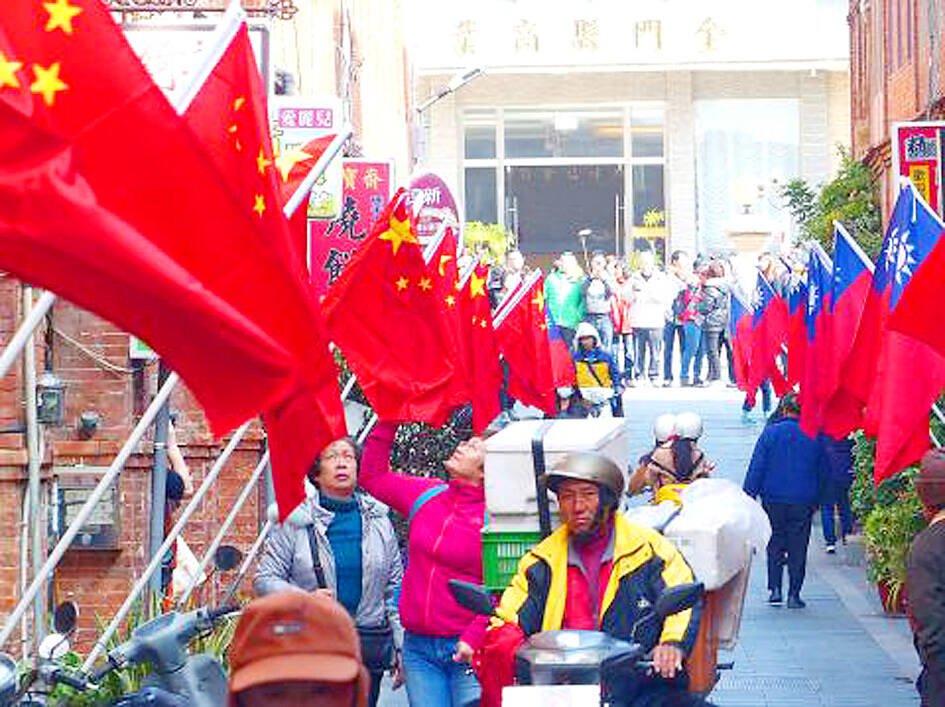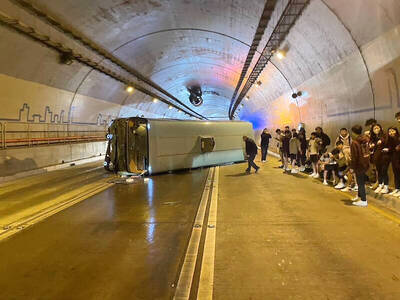The Chinese Communist Party’s (CCP) is using “united front” tactics on Taiwan’s outlying islands of Kinmen and Matsu to form the effect of “one country, two systems,” a Taiwanese academic said yesterday.
The Mainland Affairs Council has previously warned of the CCP’s “united front” work on Taiwan’s outlying islands, using Kinmen as a new model “to form an unnamed, but real ‘one country, two systems’ there.”
Sources have said that the CCP, in a bid to accelerate progress toward integration and unification with Taiwan, has permitted Taiwanese to apply for Chinese ID cards in its Fujian Province without needing to turn in their Taiwan passport or ID card, with the Chinese province allowing Taiwanese to retain both documents.

Photo: Wu Cheng-ting, Taipei Times
The CCP has also proposed the idea of a “Kinmen-Xiamen Common Living Circle,” with the aim of building an integrated transportation network between Taiwan’s Kinmen County and China’s Xiamen.
It also hopes to construct a bridge connecting Kinmen and Xiamen Xiangan International Airport, which could further integrate the two cities.
Soong Kuo-cheng (宋國誠), a researcher on Taiwan-China affairs at National Chengchi University’s Institute of International Relations, yesterday said that the two sides of the Taiwan Strait have different systems, so even though China is using economic incentives and “united front” tactics on Taiwan, it cannot change the difference between democracy and autocracy.
However, if the CCP wants to sabotage Taiwan’s democratic system, it can do so if there are local collaborators in the legislature, constantly cutting budgets and passing controversial bills, causing social disorder, he said.
Social disorder can be seen as being part of China’s unification work from within Taiwan, Soong said.
The cost of a military invasion is too high for Beijing, and Taiwanese are unlikely to accept its so-called “peaceful unification,” so the CCP sows discord among Taiwanese in the hope that Taiwan would collapse from within.
The CCP also offers some benefits to Kinmen residents, such as by provisioning water to solve its water demand issues and allowing tour groups to visit the island, claiming this helps to revitalize Kinmen’s tourism industry.
Beijing uses Kinmen to demonstrate its “one country, two systems” and to create the impression of Taiwan and China being “one family.”
If Kinmen became integrated with Xiamen as if they are one city, the CCP would say that its “one country, two systems” policy could be replicated with the whole of Taiwan, he said.
The CCP could start from small areas and gradually expand to wider areas, and once it demonstrates that the “one country, two systems” is effective, local residents might also support it, he added.
Soong said the CCP’s “united front” strategy is using the Legislative Yuan to do its unification work and also using Kinmen and Matsu to form a “one country, two systems” effect.
Asked how Taiwan should respond to Beijing’s strategy, Soong said that on tourism, Chinese group visitors to Taiwan are regulated by the Act Governing Relations Between the People of the Taiwan Area and the Mainland Area (兩岸人民關係條例), so they can only enter and leave Taiwan as a group within certain time permits, he said.
Taiwanese do not need to reject the idea of having Chinese tourists in Taiwan, he said.
What is more serious is the potential integration of Kinmen and Xiamen, or Matsu and Fuzhou, into one big city, as this type of “united front” tactics would have a greater impact on the public and governance structures, he said, adding that if China wants to extend its bridge from Xiamen to Kinmen, there could be national security issues, which the government must deal with very carefully.
Soong said the CCP is implementing an “island hopping” strategy — first Kinmen and Matsu, then moving on to Taiwan proper — to realize its goal.
Taiwan must take precautions and guard against this, he said.

The Central Weather Administration (CWA) today issued a "tsunami watch" alert after a magnitude 8.7 earthquake struck off the Kamchatka Peninsula in northeastern Russia earlier in the morning. The quake struck off the east coast of the Kamchatka Peninsula at 7:25am (Taiwan time) at a depth of about 19km, the CWA said, citing figures from the Pacific Tsunami Warning Center. The CWA's Seismological Center said preliminary assessments indicate that a tsunami could reach Taiwan's coastal areas by 1:18pm today. The CWA urged residents along the coast to stay alert and take necessary precautions as waves as high as 1m could hit the southeastern

The National Museum of Taiwan Literature is next month to hold an exhibition in Osaka, Japan, showcasing the rich and unique history of Taiwanese folklore and literature. The exhibition, which is to run from Aug. 10 to Aug. 20 at the city’s Central Public Hall, is part of the “We Taiwan” at Expo 2025 series, highlighting Taiwan’s cultural ties with the international community, National Museum of Taiwan Literature director Chen Ying-fang (陳瑩芳) said. Folklore and literature, among Taiwan’s richest cultural heritages, naturally deserve a central place in the global dialogue, Chen said. Taiwan’s folklore would be immediately apparent at the entrance of the

Speeding and badly maintained roads were the main causes of a school bus accident on a rainy day in Taipei last year that severely injured two people and left 22 with minor injuries, the Taiwan Transportation and Safety Board said. On March 11 last year, a Kang Chiao International School bus overturned inside the Wenshan Tunnel (文山隧道) on the northbound lane of the Xinyi Expressway. The tour bus, owned by Long Lai Co, exceeded the speed limit after entering the tunnel, the board’s investigation found. Sensing that the rear of the vehicle was swaying, the driver attempted to use the service and exhaust

“China is preparing to invade Taiwan,” Deputy Minister of Foreign Affairs Francois Wu (吳志中) said in an exclusive interview with British media channel Sky News for a special report titled, “Is Taiwan ready for a Chinese invasion?” the Ministry of Foreign Affairs said today in a statement. The 25-minute-long special report by Helen Ann-Smith released yesterday saw Sky News travel to Penghu, Taoyuan and Taipei to discuss the possibility of a Chinese invasion and how Taiwan is preparing for an attack. The film observed emergency response drills, interviewed baseball fans at the Taipei Dome on their views of US President